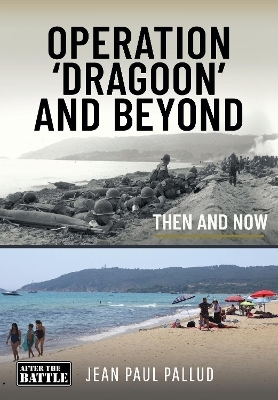
Operation 'Dragoon' and Beyond
Then and Now
Seiten
2023
Pen & Sword Books Ltd (Verlag)
978-1-3990-4611-4 (ISBN)
Pen & Sword Books Ltd (Verlag)
978-1-3990-4611-4 (ISBN)
From the Riviera, to the Rhine and on to the Colmar pocket, all three operations are covered in this volume by Jean Paul Pallud, and each show the action and locations in our unique then and now style.
The project of a landing operation in southern France was debated between American and British Allies from mid-1943, the Americans favouring the idea, the British expressing doubts on the value of such an operation. The Russians intervened in November when, at the Eureka conference at Teheran Joseph Stalin, the leader of the Soviet state, declared he was much interested in an operation in southern France. President Franklin D. Roosevelt and Prime Minister Winston Churchill agreed to launch Operation Anvil in southern France at the same time as Operation 'Overlord', the Normandy landings.
Convinced that the Allied forces in the Mediterranean would better be used in the Italian campaign, Churchill appealed directly to Roosevelt in June to cancel 'Anvil' but Roosevelt answered that he was definitely for 'Anvil'. On July 2, the Combined Chiefs-of-Staff directed General Sir Henry Maitland Wilson, the C-in-C Mediterranean Theatre, to launch Operation 'Dragoon', a three-division assault against the coast of southern France by August 14.
Under the shield of a large naval task force the US VI Corps and French forces landed on the beaches of the Riviera on August 15. Opposition from scattered German forces was weak. As the swiftly defeated German forces withdrew to the north through the Rh ne valley, pressed by the leaders of VI Corps, the French captured the ports of Marseille and Toulon, soon bringing them into operation. Troops from Operation 'Dragoon' met with the Allied units from Operation 'Overlord' on September 15. At the same time Headquarters of the US 6th Army Group, under Lieutenant General Jacob L. Devers, became operational taking command of the US Seventh Army and the French 1 re Arm e.
The swift campaign soon came to a stop at the Vosges mountains, where Armeegruppe G was able to establish a stable defence line.
The leaders of the 6th Army Group reached the Rhine in mid-November but there would be no crossing. Eisenhower ordered Devers to use whatever force necessary to clear the area between the Vosges and the Rhine and to turn the Seventh Army north as quickly as possible, attacking west and east of the Low Vosges.
In spite of its uncertain antecedents, the well-planned Operation 'Dragoon' and the forces involved along with German unpreparedness and disarray contributed to a surprisingly rapid success that liberated most of southern France in just four weeks.
The project of a landing operation in southern France was debated between American and British Allies from mid-1943, the Americans favouring the idea, the British expressing doubts on the value of such an operation. The Russians intervened in November when, at the Eureka conference at Teheran Joseph Stalin, the leader of the Soviet state, declared he was much interested in an operation in southern France. President Franklin D. Roosevelt and Prime Minister Winston Churchill agreed to launch Operation Anvil in southern France at the same time as Operation 'Overlord', the Normandy landings.
Convinced that the Allied forces in the Mediterranean would better be used in the Italian campaign, Churchill appealed directly to Roosevelt in June to cancel 'Anvil' but Roosevelt answered that he was definitely for 'Anvil'. On July 2, the Combined Chiefs-of-Staff directed General Sir Henry Maitland Wilson, the C-in-C Mediterranean Theatre, to launch Operation 'Dragoon', a three-division assault against the coast of southern France by August 14.
Under the shield of a large naval task force the US VI Corps and French forces landed on the beaches of the Riviera on August 15. Opposition from scattered German forces was weak. As the swiftly defeated German forces withdrew to the north through the Rh ne valley, pressed by the leaders of VI Corps, the French captured the ports of Marseille and Toulon, soon bringing them into operation. Troops from Operation 'Dragoon' met with the Allied units from Operation 'Overlord' on September 15. At the same time Headquarters of the US 6th Army Group, under Lieutenant General Jacob L. Devers, became operational taking command of the US Seventh Army and the French 1 re Arm e.
The swift campaign soon came to a stop at the Vosges mountains, where Armeegruppe G was able to establish a stable defence line.
The leaders of the 6th Army Group reached the Rhine in mid-November but there would be no crossing. Eisenhower ordered Devers to use whatever force necessary to clear the area between the Vosges and the Rhine and to turn the Seventh Army north as quickly as possible, attacking west and east of the Low Vosges.
In spite of its uncertain antecedents, the well-planned Operation 'Dragoon' and the forces involved along with German unpreparedness and disarray contributed to a surprisingly rapid success that liberated most of southern France in just four weeks.
Jean Paul Pallud was born in Annecy in southeastern France and graduated from Grenoble University as a Physicist Engineer. Author of several books in English and French, he is also a long-time contributor to After the Battle. Married to Marie-Fran ois he lives near his home town in the picturesque Alps.
| Erscheinungsdatum | 01.11.2023 |
|---|---|
| Reihe/Serie | Then an Now |
| Zusatzinfo | 158 mono illustrations |
| Verlagsort | Barnsley |
| Sprache | englisch |
| Maße | 172 x 246 mm |
| Themenwelt | Geschichte ► Allgemeine Geschichte ► 1918 bis 1945 |
| Geschichte ► Teilgebiete der Geschichte ► Militärgeschichte | |
| ISBN-10 | 1-3990-4611-X / 139904611X |
| ISBN-13 | 978-1-3990-4611-4 / 9781399046114 |
| Zustand | Neuware |
| Haben Sie eine Frage zum Produkt? |
Mehr entdecken
aus dem Bereich
aus dem Bereich
ein Psychologe erlebt das Konzentrationslager
Buch | Hardcover (2024)
Kösel (Verlag)
22,00 €
Mythos „Stauffenberg-Attentat“ – wie der 20. Juli 1944 verklärt und …
Buch | Hardcover (2024)
Goldmann (Verlag)
24,00 €
die letzte Woche des Dritten Reiches
Buch | Softcover (2023)
C.H.Beck (Verlag)
16,00 €


